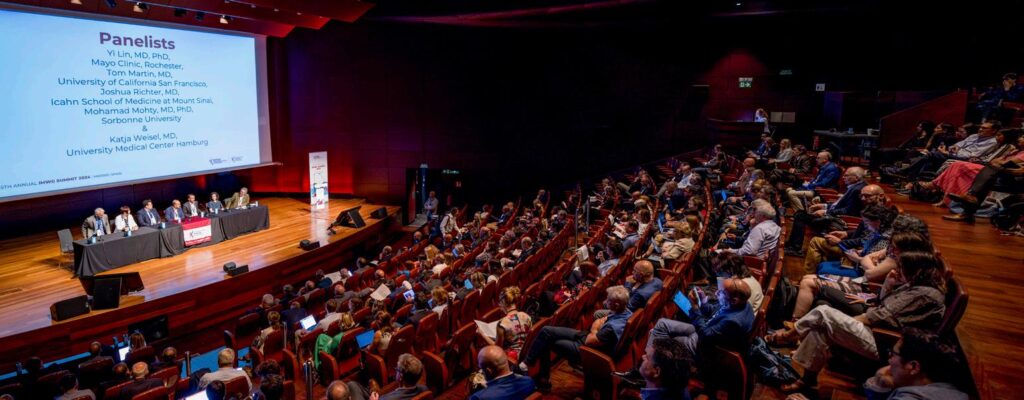As we progress through 2022 and reflect on the Key Myeloma Research Questions for 2022-2026, discussed at the 2022 IMWG Summit, both hopes and challenges for the future come into clear view. Unfortunately, the COVID-19 pandemic continues to be a significant concern, especially for myeloma patients, who remain at high risk of infection.
Blueprint for Success
Our goal of helping patients in every possible way has remained unwavering. As an international organization, the IMF quickly recognized that diagnostic testing and treatment options vary widely across the globe.
By translating information into multiple languages and holding seminars for patients and families worldwide, we’ve learned that the challenges go beyond language. Should patients be told they have cancer? Should they be informed about options that are unavailable or prohibitively expensive in their country?
For patients who have exhausted all available treatment options, the IMF’s work has been transformative—showing the need to do even more to help. Sharing medication and navigating import restrictions to obtain life-saving drugs like immunomodulatory drugs (IMiDs) are daily realities in many countries. In Japan, such efforts were made possible through the late Aki Horinouchi, a passionate patient advocate who founded IMF Japan in 1997.
This has led to our decentralized model, where guidelines and support are adapted to fit local needs. The harsh reality of limited access to treatment becomes especially evident when options run out or were never available in the first place.
In Asia and Europe, regional guidelines have been particularly helpful. Initiatives like the IMF’s Asian Myeloma Network, which provides access to new therapies through clinical trials, offer much-needed hope where it’s most scarce. The global inequities in healthcare are a stark truth we must confront.
Memories of Aki and IMF Japan
One fond memory comes to mind: on July 17, 2012, I blogged about my visit to Japan for the IMF Patient and Doctor Meetings. Aki’s presence was still felt, and the meetings were a success, with over 500 Japanese myeloma experts attending. That year, eight myeloma specialists offered one-on-one consultations with patients, and over 300 patients participated in various sessions on bone disease, renal problems, novel therapies, and key questions from 2012.
IMF Japan also continued to make strides, with initiatives like physical therapy students volunteering at patient seminars and fundraisers supporting research grants in Aki’s honor. Spending time with Aki’s wife, Midori, who continues to inspire IMF Japan, was a true highlight of the trip.
Hopes and Challenges for 2022-2026 and Beyond: A Bright Future
Immune Therapies
The arrival of numerous immune therapies—CAR T cells, bispecific antibodies, and other novel agents—brings great hope for improving outcomes and possibly achieving a cure for some patients.
The next five years will likely see longer remissions and better survival rates. However, determining the best treatment sequences will be a challenge, but these are good problems to have.
Key Challenges Ahead
While these exciting new therapies are promising, access remains limited for many patients. The top priority is ensuring access to standard-of-care (SOC) testing and treatments for the majority of patients globally, many of whom lack basic options.
Patient stories highlight these disparities and should inspire compassion and action. Addressing drug costs and exploring new ways to broaden access to care are urgent challenges we must tackle.
COVID-19 Subvariants and the Future
The spread of the BA.5 Omicron subvariant and the emergence of BA.2.75 show that the COVID-19 pandemic is far from over. According to viral surveillance, BA.2.75 has been detected in multiple U.S. states, raising concerns about the need for continued precautions.
Despite vaccinations and boosters, the risk of infection remains. Wearing high-quality masks indoors and avoiding exposure are still essential precautions.
If infected, early treatment with Paxlovid™ can be highly effective. The FDA has authorized pharmacists to prescribe Paxlovid under certain conditions, so it’s worth checking with your doctor or pharmacy to ensure there are no drug interactions.
Looking ahead to fall, new COVID-19 variants may emerge, but boosters targeting these variants are expected to be available soon. In the meantime, a third booster from currently available vaccines is a reasonable choice, especially four months after the second booster.
The Path Forward
As we face ongoing challenges, the IMF’s mission remains clear: to ensure myeloma patients have the knowledge, support, and care they need. The future is bright, and with continued research and innovation, we are moving closer to a cure.



